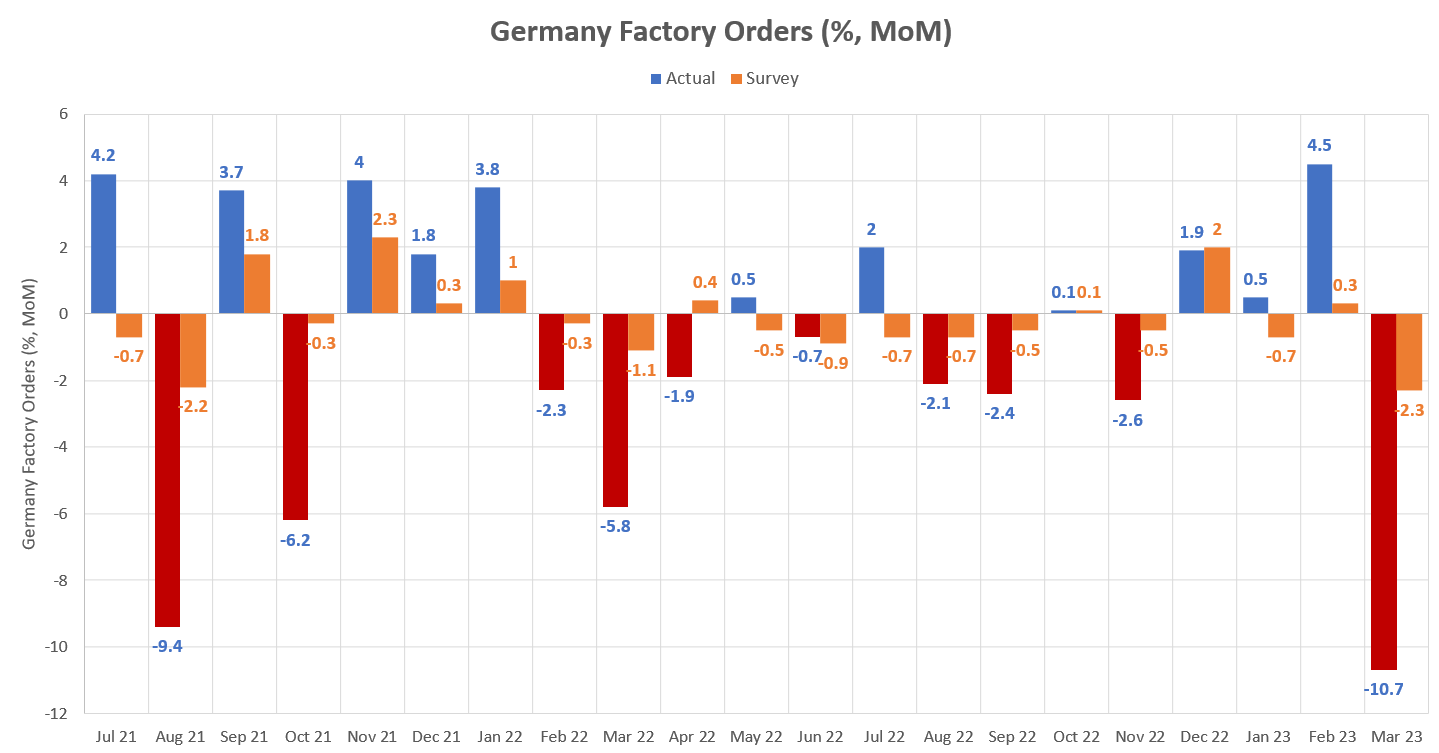You are using an out of date browser. It may not display this or other websites correctly.
You should upgrade or use an alternative browser.
You should upgrade or use an alternative browser.
European Economics Thread
- Thread starter PiSigma
- Start date
German railways and airports paralyzed by strikes
The mass walkout affects national operator Deutsche Bahn and coincided with peak hours on Friday morning
A woman stands on a platform during a rail workers’ strike on April 21, 2023, Essen, Germany © AFP / Ina FASSBENDER/AFP
Passenger trains ground to a halt across Germany on Friday morning amid a nationwide strike launched by workers’ union EVG, which is demanding pay rises for railway staff. The action coincides with similar walkouts at several major German airports which started on Thursday.
The ‘warning strike’ on rail networks began at 3am local time and is scheduled to end at 11am, meaning it covers the morning rush hours.
EVG executive board member Cosima Ingenschay argued that “by calling this time for a time-limited warning strike in the early morning hours, we send a clear signal that we do not want to affect the passengers, but rather the companies.”
Friday’s walkout has impacted city trains as well as regional and long-distance lines.
Meanwhile, a separate strike by security personnel at airports in Cologne, Dusseldorf, Hamburg, and Stuttgart is underway as workers seek pay rises. According to Germany’s ADV airport association, the walkout has affected 45,200 passengers on Thursday alone, with that number expected to reach 100,000 by the end of Friday.
While the rail strike ends at 11am, Deutsche Bahn has warned it will not resume long-haul services until at least 1pm on Friday. Delays and cancelations are expected throughout the day, the operator pointed out.
“All who can replan [their journey], should do this,” Deutsche Bahn official Martin Seiler advised. He accused EVG of losing “its sense of proportion” and provoking “chaos.”
The union is in talks with about 50 companies, including the national railway operator. It is demanding that workers’ monthly pay be hiked by at least €650 ($710) or 12% within 12 months. The minimum wage is also among the issues being discussed.
Deutsche Bahn has so far offered a 5% increase plus a one-off payment of up to €2,500 – a proposal EVG has rejected as inadequate.
Another round of wage negotiations is expected next Tuesday.
Inflation in Germany has risen to levels unseen since the 1990s over the past year, with the lingering effects of the Covid-19 pandemic and the consequences of anti-Russian sanctions stated as among the causes.
The Eurozone economy grew slightly by 0.1 percent in the first quarter of 2023 after a flat fourth quarter, but missed market consensus of a 0.2 percent expansion, a preliminary estimate showed. The surge in consumer prices due to the higher cost of energy and food, alongside the fastest pace of policy tightening by the European Central Bank in over 20 years and weakening confidence have taken a toll on the bloc's economy. Amongst the Eurozone's largest economies, Germany registered no growth in the first quarter, while the economies of France, Italy, and Spain did expand.
source: EUROSTAT
Annual inflation rate in France rose to 5.9% in April of 2023 from 5.7% in March, above market forecasts of 5.7%, preliminary estimates showed. Cost grew further for energy (7% vs 4.9% in March) and services (3.2% vs 2.9%). On the other hand, inflation slowed slightly for food (14.9% vs 15.9%) and manufactured products (4.7% vs 4.8%). On a monthly basis, the CPI rose 0.6%, following a 0.9% increase in March. Meanwhile, the harmonised CPI was up 0.7% on the month and surged 6.9% on the year.
source: INSEE, France
The annual consumer price inflation rate in Spain quickened to 4.1% in April 2023 from an over 1-1/2-year low of 3.3% in the prior month, though below market expectations of 4.4%, a preliminary estimate showed. This evolution was mainly due to the fact that the decrease in electricity prices was smaller compared to April 2022, and fuel prices rose after falling a year ago. Meanwhile, prices of food and non-alcoholic beverages slowed down. The annual core inflation, which strips out volatile fresh food and energy prices, was at a five-month low of 6.6% in April, down from 7.5% in March, as the energy shock fades. On a monthly basis, consumer prices increased by 0.6% in April, after a 0.4% rise in the prior month and below market forecasts of 0.9%.
source: National Statistics Institute (INE)
source: EUROSTAT
Annual inflation rate in France rose to 5.9% in April of 2023 from 5.7% in March, above market forecasts of 5.7%, preliminary estimates showed. Cost grew further for energy (7% vs 4.9% in March) and services (3.2% vs 2.9%). On the other hand, inflation slowed slightly for food (14.9% vs 15.9%) and manufactured products (4.7% vs 4.8%). On a monthly basis, the CPI rose 0.6%, following a 0.9% increase in March. Meanwhile, the harmonised CPI was up 0.7% on the month and surged 6.9% on the year.
source: INSEE, France
The annual consumer price inflation rate in Spain quickened to 4.1% in April 2023 from an over 1-1/2-year low of 3.3% in the prior month, though below market expectations of 4.4%, a preliminary estimate showed. This evolution was mainly due to the fact that the decrease in electricity prices was smaller compared to April 2022, and fuel prices rose after falling a year ago. Meanwhile, prices of food and non-alcoholic beverages slowed down. The annual core inflation, which strips out volatile fresh food and energy prices, was at a five-month low of 6.6% in April, down from 7.5% in March, as the energy shock fades. On a monthly basis, consumer prices increased by 0.6% in April, after a 0.4% rise in the prior month and below market forecasts of 0.9%.
source: National Statistics Institute (INE)
British infrastructure agency says leaked report
A leaked report has said there is not enough money to do more than make do and mend for the next five years, and Britain will have to live with a rising tide of unplanned repairs and failures.All state schools in England may shut in ‘unprecedented’ coordinated strikes
They should see if they can trade in the Prince of Wales carrier for a quick quidBritish infrastructure agency says leaked report
A leaked report has said there is not enough money to do more than make do and mend for the next five years, and Britain will have to live with a rising tide of unplanned repairs and failures.
All state schools in England may shut in ‘unprecedented’ coordinated strikes
EU’s largest economy can’t do without China – leading carmaker
Germany’s level of dependence makes decoupling “unthinkable,” the Mercedes-Benz CEO has warned
People visit Mercedes Benz booth during the 20th Shanghai International Automobile Industry Exhibition at the National Exhibition and Convention Center (Shanghai) on April 19, 2023 in Shanghai, China. © VCG / VCG via Getty Images
Cutting ties with China would put most of Germany’s industry at risk, the CEO of luxury carmaker Mercedes-Benz warned on Sunday.
Ola Kaellenius was interviewed by newspaper Bild am Sonntag after returning from a business trip to China, the German manufacturer’s largest and the most important market.
There have been growing concerns in Germany and the EU as a whole about the region’s economic dependence on China, which is one of its leading trading partners and the top supplier of raw materials critical for green transition.
“The major players in the global economy – Europe, the USA and China – are so closely intertwined that disengaging from China makes no sense,” Kaellenius said. “Decoupling from China is an illusion, and also not desirable,” he added.
China has the largest car market in the world, and German carmakers are heavily dependent on it. Mercedes-Benz’s main shareholders are the Chinese BAIC Group and Geely Chairman Li Shufu. In 2022, China accounted for 18% of revenues and 37% of car sales at Mercedes-Benz, according to Reuters.
When asked whether it would be conceivable for Mercedes-Benz to discontinue its business in China, should political tensions around Taiwan escalate as occurred with Russia after the start of the conflict in Ukraine, the Mercedes-Benz boss replied: “That would be unthinkable for almost the entire German industry.”
Europe depends on China for 98% of its rare-earth elements, which are used in wind-power generation, hydrogen storage, and batteries. It also gets 97% of its lithium for batteries from the country. China has a dominant position in processing rare earths, with roughly 60% of the world’s lithium refined in the east Asian country. The EU also gets 80% of its solar panels from China.
German industry has to become “more resilient” and “more independent of individual countries,” for example when it comes to lithium batteries, Kaellenius said.
European Commission President Ursula von der Leyen said last month that it was not viable for the bloc to decouple from China, but it needed to reduce risk and “rebalance” its economic ties.
Last edited:
At current levels, the UK will be poorer than Poland in a decade, and will have a lower median real income than Slovenia by 2024. Many provincial areas already have lower GDPs than Eastern Europe..
The British governing and commercial classes may well vampirically draw on financial and institutional soft power for at least another century.
That's a pretty optimistic prediction. If the UK doesn't get nuked by Russia, it will definitely get partitioned with the help of China by the 2040s. Does the UK think it has goodwill globally or something?It may take another hundred years, and the total breakup of the United Kingdom itself, for the country to feel the full effects of elite dissolution.

Wow, -10.7% decline in Germany factory orders vs -2.3% expected, highlighting much lower demand for goods from the European largest economy.
There were only two times in the last 30+ years when German factory orders fell by a larger amount - Covid and 1991.
German economy will continue to implode as their motor industry will be out competed by South Korea and China. They continue to rely on production of cars and airplanes to fuel economic growth but that is bound to collapse over next decade. They have failed in all the new economic sectors they tried to enter. And their costs keep increasing now that they lost their largest commodities supplier. Germany and all of Europe will deindustrialize.
